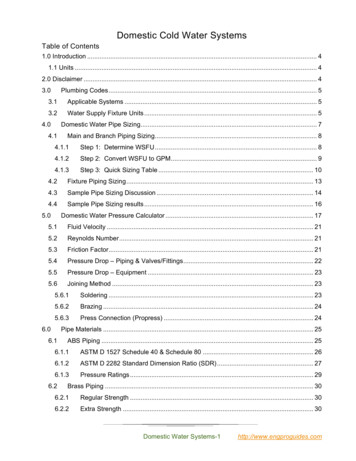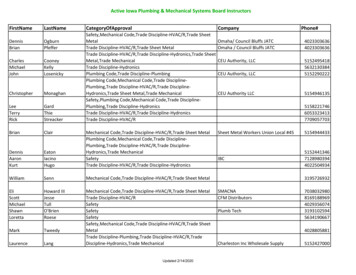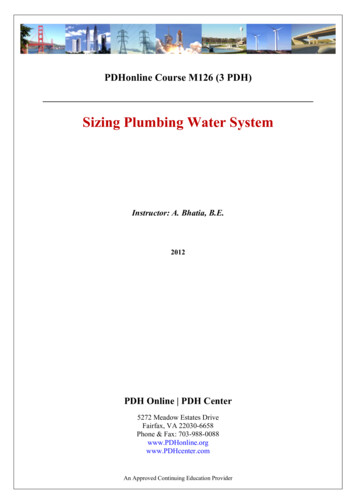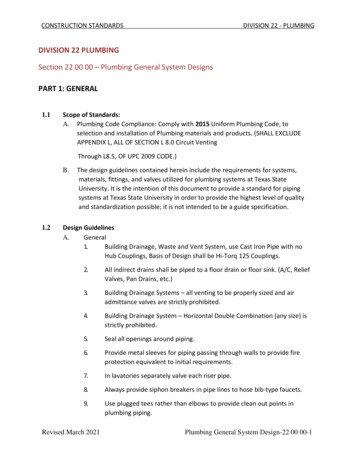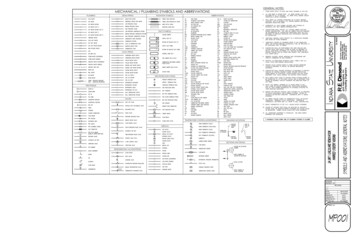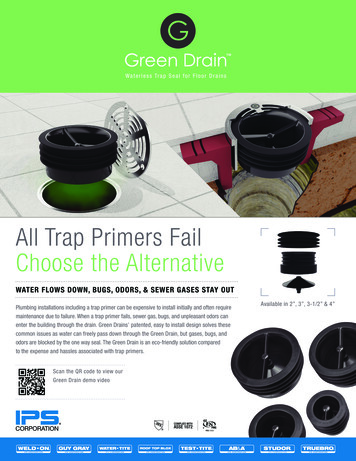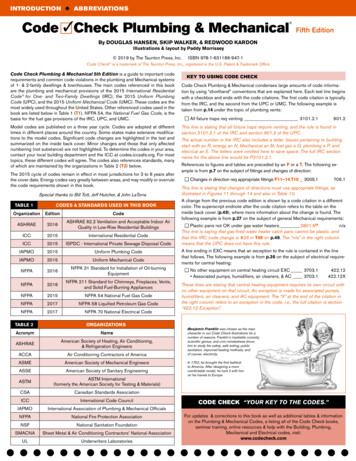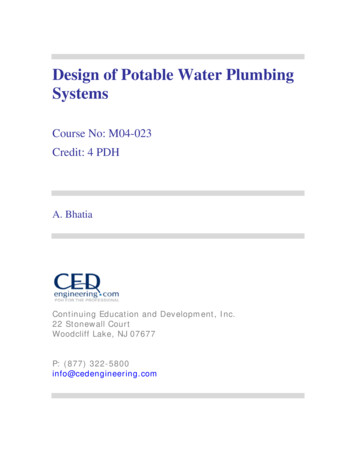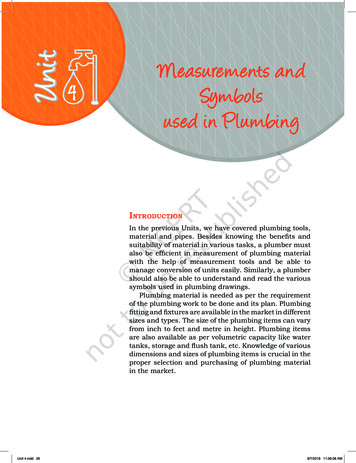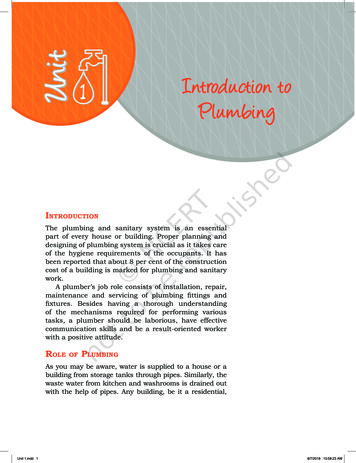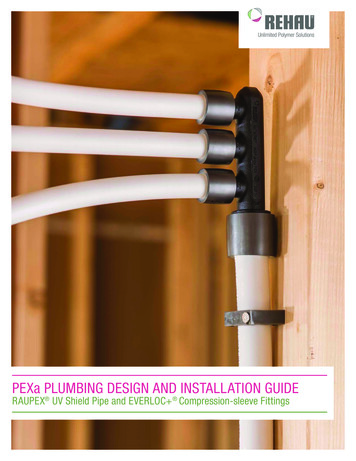
Transcription
Statewide Plumbing and Mechanical SystemsInspections Study ReportPresented to the Iowa State LegislatureDecember 1st, 2010Study and concluding report presented by:Iowa Plumbing and Mechanical Systems Licensing BoardIowa Electrical Examining BoardIowa Association of Building OfficialsIowa Chapter of Int’l Association of Plumbing and Mechanical Officials0 Page
Executive SummaryIn accordance with Chapter 151, Section 33 of the 2009 Iowa Acts, the Iowa Plumbing andMechanical Systems Board, in conjunction with the Electrical Examining Board and city andcounty building officials, conducted a study to determine the most appropriate and feasiblemanner to implement a statewide inspection program for work performed by licensees of bothboards.The Inspection Study Committee provides this report to summarize the findings of its work alongwith the following recommendations for a statewide inspection program: A statewide inspection program is recommended to compliment the newly establishedstatewide licensing program for plumbing and mechanical professionals. A statewide inspection program will provide Iowan’s greater assurance that theinvestments they make in their plumbing and mechanical systems in their homes andbusinesses meet minimum code requirements. A statewide inspection program for plumbing and mechanical systems should be separateand distinct from the electrical inspection programs due to the level of expertise neededfor each discipline. A statewide plumbing code already exists, however a statewide mechanical code does notexist. The legislature should call for the adoption of a statewide mechanical code. Local jurisdictions should be allowed to continue to carry out inspections. Localjurisdictions should be included in the development of the statewide inspection programto ensure state and local inspection programs are closely aligned to minimize confusionfor licensees working in multiple jurisdictions. A statewide inspection program should apply to an entire agricultural operation for thepurposes of the state plumbing code, and a statewide inspection program should applyonly to residential agricultural buildings for the purposes of a state mechanical code. A statewide inspection program should be initiated in two phases. Up to a two-yearplanning and development phase, and then an implementation phase to begin no laterthan the start of year three. The statewide inspection program should be fully self-supported through fees collectedthrough permit and licensing fees. The cost of a statewide inspection program will besignificant; however startup costs can be covered by licensing fees retained by thePlumbing and Mechanical Systems Board with no impact on the general fund.1 Page
Section 1 - BackgroundThe 2007 Legislative Session brought the passage of legislation to create the Plumbing andMechanical Systems Licensing Board (2007 Iowa Acts, Chapter 198) as well as the ElectricalExamining Board (2007 Iowa Acts, Chapter 197). With the passage of the 2007 Iowa ActsChapter 197, the Electrical Examining Board was directed to establish statewide inspections forwork completed by the licensees of that board. In contrast, the Plumbing and MechanicalSystems Board was not granted the authority to create a statewide inspection program for thework conducted by its licensees. This discrepancy was not addressed again until the 2009Legislative Session when discussion occurred among legislators about the need to create astatewide inspection program that covered the work performed by licensees of the Plumbing andMechanical Systems Board. It was recognized that the possibility of duplication of effortsbetween inspection programs for each of the respective boards was an issue that needed furtherconsideration and study before the legislature could act.In accordance with Chapter 151, Section 33 of the 2009 Iowa Acts, the Iowa Plumbing andMechanical Systems Board, in conjunction with the Electrical Examining Board and city andcounty building officials, conducted a study to determine the most appropriate and feasiblemanner to implement a statewide inspection program for work performed by licensees of bothboards. The following pages summarize the methods and findings of the study, followed byrecommendations for consideration by the legislature.Section 2 - Inspection Study CommitteeIn response to the 2009 Iowa Acts, the Iowa Plumbing and Mechanical Systems Licensing Board(PMB) established an Inspection Study Committee. The board requested participation from theIowa Dept of Public Health (IDPH) Electrical Examining Board (EEB), the Iowa Building CodeCommissioner’s Office (BCC), the Iowa Association of Building Officials (IABO), and the IowaChapter of the International Association of Plumbing and Mechanical Officials (IAPMO). Eachof these organizations nominated at least two individuals to serve on the Inspection StudyCommittee. Representation was as ABOIABOIABOIAPMOIAPMOIAPMOIAPMO2 PageRepresentativeRon MastersChuck ThomasMick GageKen SharpCynthia HoulsonBarb MentzerRod VanWartStuart CrinePat MerrickCody ChristensenRoger SchemmelJeff Harden (alternate)Don HansenBob LynchBill Schweitzer (alternate)Mike Minnick (alternate)JurisdictionChair (thru 4/2010)SecretaryPMB MemberDivision DirectorPMB ExecutiveElectrical Board ChairElectrical Board MemberBuilding Code CommissionerChief Electrical InspectorCity of Des MoinesCity of UrbandaleCity of AltoonaCity of Des MoinesCity of Cedar RapidsIAPMOCity of Des Moines
In addition to the members named to the committee by each organization, the committee alsoheld meetings with representatives of the Iowa Farm Bureau Federation as well as the IowaLeague of Cities to discuss issues relevant to those organizations.Section 3 - Importance of InspectionsInspections of plumbing and mechanical systems help to ensure the safety, health, and quality oflife of the public. Coupled with the requirements for licensure that focus on the skills andknowledge of plumbing and mechanical professionals, a statewide inspection program will resultin a comprehensive plumbing and mechanical program for the state of Iowa.Most people take for granted the benefits of a properly installed plumbing or mechanical system.But few people seldom consider the various components and issues involved in the properinstallation of these systems and the impact it has on our health, safety, and comfort. Aninstallation that is done poorly or that is non-code compliant can present serious risks to theoccupants of that building. A quality inspection program will reduce the occurrence of non-codecompliant installations. Common examples of problems associated with poorly installed systemsinclude:Carbon monoxide poisonings or deaths that result from a heating system or water heaterthat is not properly ventilated.Water heaters that can explode and literally become a missile that launches through ahome or business because the water heater was improperly installed.Contamination of a water supply becomes contaminated because of a cross connectionbetween potable water and non-potable or other liquid contaminant created as a result ofimproper plumbing practices.Sewer gas odors entering a house that present a serious health risk to occupants becausethe plumbing system was not properly vented to allow sewer gases to escape to theoutside.Section 4 - Existing InfrastructureThere is no centralized location for information regarding how local jurisdictions in Iowaimplement and manage their respective plumbing and mechanical inspection programs. Inrecognition of this limitation, the committee initiated a statewide survey of local building andinspection officials to gain a better understanding of current local inspection programs. Thesurvey tool was created and managed by the Iowa Association of Building Officials with directinput and guidance from the Inspection Study Committee regarding the information being soughtand the questions used in the survey.The Survey was conducted in the summer of 2010. The survey was distributed to localjurisdictions across Iowa through professional organizations and resulted in responses from 40local jurisdictions. The survey gained valuable information regarding demographics of localjurisdictions that administer permitting and inspection programs; permitting requirements, suchas what kind of work requires a permit to be pulled; permit fees; inspection requirements, such ashow many inspections, when they are done, etc.; staff information such as pay, education andtraining requirements, and workload capacity. A summary of these key items follows:3 Page
The 40 local jurisdictions that responded issued an average of 20,634 permits each year.The population covered is approximately 700,000.Permits are issued for new construction and remodel projects on both residential andcommercial sites, as well as for various component repair/replacement such as waterheaters, duct work, gas supply lines, etc.The predominant way of charging a fee is using a calculated fee schedule based onfixture counts.Inspectors are expected to meet a minimum experience requirement and often arerequired to obtain inspector certification through either IAPMO or the International CodeCouncil.Inspections are typically conducted within 24 hours upon request.Local jurisdiction permit fees for plumbing average 25 for a water heater replacement, 44 for a 800 ft.2 basement finish with bath, 79 for a 600 ft.2 residential room additionw/ one new full bath, 315 for a new 5,000 ft.2 commercial building, 453 for a 2,000 ft.2new ranch home, and 770 for a new 12 unit apartment building.Local jurisdiction permit fees for mechanical permits average 35 for a 800 ft.2 basementfinish with bath, 72 for a 600 ft.2 residential room addition w/ one new full bath, 300for a new 5,000 ft.2 commercial building, 150 for a 2,000 ft.2 new ranch home, and 675for a new 12 unit apartment building.Section 5 - Considerations for Statewide Plumbing and Mechanical InspectionsA. Mechanical Code AdoptionThe State of Iowa has not adopted a statewide Mechanical Code. Currently, the Iowa Dept ofPublic Safety, State Building Code Bureau has authority under Iowa Code 103Ato adopt aMechanical Code that is applicable only to State buildings and buildings constructed with stateappropriated funds in areas without local building code enforcement. The lack of a statewideMechanical Code creates challenges for adopting a statewide plumbing and mechanicalinspection program. Without minimum construction standards for mechanical systems, there isnot a minimum standard by which inspectors can reasonably enforce installation of mechanicalsystems. In order for an effective statewide inspection program to be implemented, theInspection Study Committee recommends the adoption of a statewide mechanical code, but is notrecommending whether the adoption authority remain with the Department of Public Safety orbe transferred to the Plumbing and Mechanical Systems Licensing Board.B. Local Inspection AuthorityThe Inspection Study Committee could not arrive at a consensus on how to incorporate localjurisdictions into a state-wide inspection program. The only sure agreement is that localjurisdictions should retain the authority to conduct inspections locally. The key challengesassociated with the incorporation of local inspection authority are as follows:The Iowa Plumbing and Mechanical Systems Licensing Board is responsible for adoptingthe state plumbing code in Iowa. The Board has adopted the 2009 version of the UniformPlumbing Code (2009 UPC) with amendments, found at 641IAC – Chapter 25. Localjurisdictions maintain home-rule authority under Iowa Code 364.3(3), and subsequentlythere are a number of local jurisdictions that have adopted the International PlumbingCode as part of their local building codes.4 Page
With two different codes adopted across jurisdictions within the State of Iowa licenseeshave expressed concern regarding the inconsistencies in which code requirements theyare expected to meet when working from community to community. Furthermore, as ofJanuary 1, 2010 all plumbing and mechanical licensees must pass a Board approvedexam. The exam for plumbing licensees is based on the State of Iowa Plumbing Code(2009 UPC) and for the mechanical licensees is based on the 2009 InternationalMechanical Code (2009 IMC); this raises additional concerns from licensees regardingthe fact they are being tested over one code and are required to follow a different code incertain local jurisdictions.If local jurisdictions are expected to adopt the State of Iowa Plumbing Code it will placea burden on local jurisdictions that currently adopt and enforce the InternationalPlumbing Code (IPC). Concerns have been raised by these local jurisdictions that therewill need to be considerable resources committed to make local rule changes, to re-traininspection staff on the 2009 UPC, and that their local contractors will also have to learn anew code. This is true with any new update to either the UPC or the IPC. Code updatesoccur on a 3 year cycle.Because of the impasse, this report will outline the options that were considered with a briefexplanation of pros and cons of each option:Option 1: Full adoption of the state-wide inspection program in local jurisdictionsThe leading argument for creating state-wide licensing requirements was to create a levelplaying field where all licensees were expected to meet the same requirements regardless ofwhere in Iowa they worked. Under Option 1 local jurisdictions would be required to align theirlocal inspection programs so that every jurisdiction in Iowa is operating under the State of IowaPlumbing Code and local jurisdictions would be required to align their employment requirementsfor inspectors with the state inspector positions. This transition would not be expected to occurover-night. Local jurisdictions would be given a grace period of up to five years from the start ofa state-wide inspection program to make the transition.Pros:Licensees operate under the same set of rules everywhere they work in Iowareducing confusion on what code to comply with.The qualifications of inspectors will result in a more consistent application of thecode.Local inspectors would be “grand-fathered” in and only newly employed staffwould be required to meet the state-level qualifications.Local jurisdictions would be given 5 years to make transitions, during which timethey will have had to make code modifications anyway.Cons:Local jurisdictions will lose the tradition of “home rule”.There will be potential increases in staff salary due to the state level experienceand education requirements for positions.Local jurisdictions operating under a code different than the State of Iowa Codewill incur training expenses for inspectors to become proficient in the code.5 Page
Local jurisdictions will need to make rule changes to align code, employmentrequirements, etc.Option 2: Allow local jurisdictions to operate independently under “home rule”As a home rule state, Iowa has a long tradition of recognizing the authority of localjurisdictions to create and enforce regulations that are no less stringent than State Law while atthe same time giving that local jurisdiction the flexibility to address its specific needs.Pros:No cost or impact to the local jurisdiction.Cons:State of Iowa licensees will continue to face the challenges associated withcomplying with different rules for different jurisdictions.Inconsistencies will occur in the qualifications of inspection staff.Option 3: A hybrid of Option 1 and Option 2A final possibility is to consider a “middle ground” between Option 1 and Option 2.Finding middle ground will move the plumbing and mechanical industry towards a moreconsistent playing field, yet still address some of the concerns expressed by local jurisdictions.An example could be that upon implementation of a state-wide inspection program, localjurisdictions will be given a period of up to five years to transition to the State of Iowa Code,giving them almost two full code cycles to transition their rules as well as train local inspectionstaff on the State of Iowa Plumbing and Mechanical Code in effect at that time. On the otherhand, local jurisdictions would be given flexibility to determine the qualifications needed fortheir inspection staff without the expectation that those inspectors would meet the state levelrequirements. Many local jurisdictions are small enough that they cannot justify havingdesignated staff for each trade type, so there is a need for one inspector to cover all trades.Pros:Option 3 moves the State in the right direction by more closely aligning therequirements of plumbing and mechanical professionals.Gives local jurisdictions ample time to plan and prepare for any modificationsneeded to align their local code with the applicable State Code.Gives local jurisdictions the flexibility to determine the appropriate qualificationsfor their inspection staff.Presents less of a burden on local jurisdictions.Cons:Inconsistencies will remain on staff qualifications.Local jurisdictions will give up authority to independently adopt separate codes.Local jurisdiction will be burdened with aligning local codes with state codes,which may add additional rule changes or increase the amount of training neededby local inspectors.C. Merged vs. Separate Inspection StaffWhen the need for a statewide inspection program was raised during the 2009 legislative session,there was interest in simply adding additional inspectors to the existing statewide electrical6 Page
inspection program and to train the electrical inspectors to conduct plumbing and mechanicalsystem inspections. The Inspection Study Committee gave consideration to this concept in theinterest of minimizing duplication of inspection services and to ensure the most efficient use offees paid by licensees and the public. The following are the Pros and Cons that were consideredas part of a combined statewide inspection program:Pros:A potential cost savings in having potentially fewer inspectors.A potential cost savings in having fewer managerial/supervisor staff.A potential cost savings due to economies of scale.One point of contact for permit holders to contact for scheduling inspection purposes, etc.Cons:Because state electrical inspection staff were hired as electricians, it would be difficult totrain them to perform plumbing and/or mechanical inspections at the same level as theyperform electrical inspections. State plumbing and mechanical inspectors should be heldto the same level of expertise as electrical inspectors.Combining state electrical, plumbing, and mechanical inspections programs might notcreate significant efficiencies because the plumbing, mechanical, and electrical work canoccur at different stages of construction.After weighing the “pros” and “cons” of a merged inspection program, the Inspection StudyCommittee recommends that a separate inspection program for plumbing and mechanicalsystems with separate inspection staff be created.D. Staffing needsBased on patterns observed from the Department of Public Safety’s (DPS) electrical inspectionprogram it is estimated that a statewide plumbing and mechanical inspection program willgenerate approximately 20,000 permits each year. Information obtained from the survey of localinspection programs indicates each permit generates a minimum average of 2 inspections for aminimum of 40,000 on-site inspections per year. Data from the local survey and the DPS alsoshows that inspectors average approximately 5 inspections per day over a year long period.Furthermore there is realistically 235 work days in a year per employee (52wks x 5days 260days/yr - 25days [5 weeks for vacation/holidays/sick leave] 235 working days per inspector peryear)Using the figures of 40,000 inspections and 235 work days (40,000/235), results in an average of170 inspections every work day. To cover this estimate of 170 inspections with an average offive inspections performed per day by each inspector (170/5), it is estimated a total of 34inspectors will be needed to effectively conduct the minimum number of inspections needed for20,000 permits.State inspection staff should be well qualified to review and critique plans as well as adequatelyconducts inspection on job sites to ensure compliance with appropriate plumbing and mechanicalcodes. For this purpose, state inspection staff should be required to have a minimum of fiveyears experience in the plumbing and/or mechanical trades. In addition, it is important to require7 Page
state inspectors be licensed via examination in the applicable trades. Obtaining a license throughexamination will demonstrate to the Iowa Department of Public Health, the Plumbing andMechanical Licensing Board, as well as the licensees whose work is being inspected that theinspector has demonstrated they are knowledgeable in the trades. Finally, state inspection staffshould obtain certification through an appropriate Code Council certification program forinspectors.E. BudgetImplementing a statewide inspection will have significant start-up costs and long term operatingcosts. However, it is anticipated that the inspection program will not be a burden on the statebudget. The Inspection Study Committee recommends the inspection program should be fullysupported through permit fees paid by the users of the inspection program.To estimate the cost of administering the program, key consideration was given to the followingkey components of operating an efficient and highly professional inspection program:Adequate # of inspectors is needed to ensure inspections are completed in a timelyfashion.Inspection staff will be located in home/field offices to ensure the most efficient use oftravel time to inspection sites.Inspection staff will be provided 4WD utility pick-ups to ensure accessibility to job sites,with appropriate equipment and safety gear. In addition, each inspector will be equippedwith a cell phone, laptop, and air card for remote access to enter live data into theinspection software.Inspection staff will be expected to have at least 5 years of experience, and will possessor be expected to obtain industry certifications as an inspector within one year ofemployment.One supervisor and two administrative support staff will be needed to provide support to34 inspection staff. Inspection staff leads will be assigned by regions of the state to assistthe supervisor in management of workloads.Electronic permitting, inspection records, and reporting will be created. It is planned thatthis capacity will be added onto the existing Plumbing and Mechanical Professionalslicensing software. There are no development costs, rather the software development andmaintenance is supported through transaction fees paid by IDPH.IDPH charges an 8% administrative fee to all fee based programs to provide support forthings such as managing time reporting, handling travel vouchers, expense claims,personnel matters, and overall management responsibilities.A detailed estimated budget follows:ItemPersonnel1Fringe8 PageDescription1 - Supervisor (PSE 3) @ 64,1531 – Admin Assistant (AA1) @ 35,2581 – Clerk Specialist (Clerk Sp) @ 30,75134 – Inspectors (Inspector) @ 49,786Personnel x 30%Cost 1,822,866 546,856
Travel2Vehicle3Fuel & Veh OperationStaff TrainingOffice formation Technology costsMiscAdmin supportTotal:34 Inspectors X 235 days/yr x 14ave/day34 vehicles @ 20,000 fully equipped (start upcost only)4 year replacement value 170,000/yr25,000 miles/yr / 15mpg 1,667gal/yr/vehiclex 34 vehicles 56,678 gal x 2.70 153,0306 Oil changes x 34 vehicles 204 oil changes@ 25 5,10035 staff x 500/yr registration/training fees35 laptops @ 1,00035 Air cards @ 15037 Office set-ups @ 4,00037 staff @ 1,500/yr ave for general supplies34 staff @ 500 for inspection equipment(tools, flashlight, safety gear, etc)37 staff x 4,000/yr (to include home office,air card, cell phone, etc.)To cover creating, printing, and mailinginformational brochures re: inspections,routine mailing related topermits/inspections/etc.20,000 permits x 7 database admin fee20,000 permits x 4 credit card/bank fee (ave)100 hrs consulting/IT service x 100/hr37 staff x 750 annual DAS admin fees8% of all expenditures 111,860 850,000 158,130 17,500 260,750 148,000 75,000 230,000 27,750 339,897 4,588,5791Personnel is figured at 5-10% above base salary to start, annually thereafter an average 7% increase will occur tocover COLA and merit increase.2Travel is an estimated average of 50% of the daily perdiem rate of 28/day.3It is estimated that on average vehicles will need to be replaced every 4 years, depending on rural vs. urban use,creating a need to budget annually approximately 110,000 to cover the four year replacement average.4Estimated budget total is based on estimated permit numbers, adjustments will be needed pending actualworkload. Furthermore, the budget does not reflect inflation costs and other related cost adjustments for futureyears.F. Permit/Inspection FeesIt is the recommendation of the Inspection Study Committee that the statewide inspectionprogram operate on a fully fee supported basis. This may be a combination of permit fees aswell as support from fees generated from the Plumbing and Mechanical Systems LicensingBoard. Based on the estimated budget, and assuming 20,000 permits per year, the averagepermit will cost the State approximately 229.43. As was noted in Section 5 of this report, localjurisdiction permit fees are highly variable depending on the scope of the work being performed.It should also be noted that in most cases the permit fee includes the cost of the inspection,within reason. Some local jurisdictions do have a “call-back inspection” fee that can be chargedin situations where the person performing the work is either not completing the work when theysaid it would be done, or the work is not code compliant after multiple visits by the inspector.9 Page
This additional fee is generally used only as a way to off-set disproportionate costs of having tomake several visits to one job site.After reviewing fee information from the survey results, the Inspection Study Committeerecommends that fee schedules should not be set in code. Rather, the fee authority shouldremain in rule to enable the Plumbing and Mechanical Systems Board flexibility in adjusting feesappropriately up or down to better reflect the cost of administering the statewide inspectionprogram. In addition, the Plumbing and Mechanical Systems Board will be better positioned toevaluate the permit fee charged to Iowans and may be able to offset the fee charged to Iowanswith fees retained as part of the licensing program.G. Applicability to Agricultural and Farmstead settingsThe applicability of statewide inspections in agricultural settings was discussed with input fromIowa Farm Bureau Federation (IFBF). Because of a long standing history of exemptions foragricultural properties as it relates to certain state and local codes, it is no surprise that there is adifference of opinion on the issue of inspections for plumbing and mechanical systems onagricultural properties. The concerns raised by IFBF include:There is long standing precedent set for agricultural exemptions from certain state andlocal codes.Agricultural buildings and structures differ from commercial buildings and residentialbuildings in terms of use and construction so some of the design requirements of certaincodes (especially mechanical codes) are not applicable to agricultural buildings.Iowa Code Chapter 105 already provides exemptions for property owners from licensingas long as they are working on their own property, it is IFBF’s opinion this exemptionshould also apply to inspection requirements.The Inspection Study Committee agrees that agricultural buildings (non-human occupancy) aregenerally not considered to be covered by a mechanical code. However, the committee shares adifferent opinion than that of IFBF regarding the appropriateness of statewide inspections onagricultural properties. It is the committee’s opinion that the design and construction standards(and the need to verify those through an inspection program) should not differ based on whethera building is sitting on a 6,000 square foot lot in town vs. sitting on a 600 acre farm in rural Iowa.For example, agricultural practices include the use of a variety of farm chemicals that are mixedon the farmstead. In many areas of Iowa that farmstead is served by a rural water system thathundreds or perhaps thousands of other customers rely on for safe drinking water. Significantfocus on backflow prevention is given in the State Plumbing Code, and to disregard the need tocomply with such prevention measures presents a risk to rural water supplies if agriculturalproperties do not comply with the State Plumbing Code. There are real dangers associated withunsafe farm practices that could result in a garden hose drawing farm chemicals out of a mixingtank if a pressure loss on the water distribution system is experienced, that event could result inevery customer of the water supply being exposed to a farm chemical through their drinkingwater. This same risk is also present for farm families that rely on private water wells for theirwater needs.The committee recommends that a statewide inspection program should apply to an entireagricultural operation for the purposes of the state plumbing code, and a statewide inspection10 P a g e
program should apply only to residential agricultural buildings for the purposes of a statemechanical code.Implementation and Timing of a Statewide Inspection ProgramA key lesson learned by both the Plumbing and Mechanical Systems Licensing Board and theElectrical Examining Board is that implementation of statewide
The Iowa Plumbing and Mechanical Systems Licensing Board is responsible for adopting the state plumbing code in Iowa. The Board has adopted the 2009 version of the Uniform Plumbing Code (2009 UPC) with amendments, found at 641IAC - Chapter 25. Local jurisdictions maintain home-rule authority under Iowa Code 364.3(3), and subsequently
